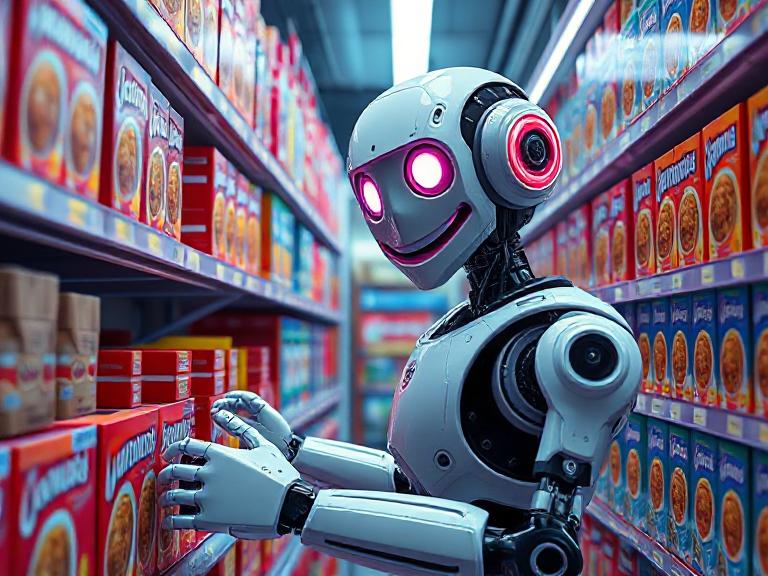AI for Offline Businesses: Smart Tools for Retail, Restaurants & More
Introduction
When most people think of artificial intelligence, they picture software tools, apps, or remote teams working online. But AI isn’t just for digital businesses—it’s making a huge impact on offline businesses too. From retail shops to restaurants and local service providers, AI is helping small businesses save time, cut costs, and improve customer experiences like never before.
In fact, many AI tools now cater specifically to brick-and-mortar businesses, offering everything from smart inventory management to AI-driven customer engagement and sales analytics. If you’re running a physical business, you don’t have to be left behind. Here’s how to use the best AI tools for small businesses—even if you don’t operate online.
1. AI-Powered Point-of-Sale (POS) Systems
Modern POS systems do more than process payments—they now include built-in AI to help analyze customer behavior, manage inventory, and even predict what products are likely to sell next.
Top Tools:
-
Square – Uses AI to suggest stock restocking and identify top-selling products
-
Toast – Great for restaurants with automated inventory and customer insights
-
Lightspeed – Offers AI-based sales reporting and demand forecasting
Example:
A boutique clothing store in Chicago used Lightspeed’s AI analytics to identify its best-performing product combinations, leading to a 15% increase in average transaction value in just two months.
2. AI for Personalized Customer Experience
AI chatbots and recommendation engines aren’t just for e-commerce. Offline businesses can also use them to build stronger relationships with local customers through SMS, email, or loyalty apps.
Top Tools:
-
Tidio – Combines live chat and AI responses for local businesses
-
Fivestars – AI-powered loyalty and rewards automation
-
Marsello – Offers personalized email and SMS marketing based on in-store purchases
Example:
A local pizzeria used Marsello to send targeted text promos based on each customer’s order history. Repeat visits increased by 25% in 6 weeks.
3. Smart Inventory and Supply Chain Management
Manual stocktaking is one of the biggest time-wasters for offline businesses. AI-powered tools now track stock levels in real-time, predict shortages, and automatically reorder supplies when needed.
Top Tools:
-
Zoho Inventory – AI-driven reordering and low-stock alerts
-
SyteLine (Infor) – Advanced AI supply chain management for manufacturers
-
TradeGecko (now QuickBooks Commerce) – Excellent for retail inventory forecasting
AI also helps reduce waste—especially important for restaurants and grocery stores.
4. AI Surveillance and Security
AI isn’t just about marketing—it can also improve your physical space’s safety and efficiency. Smart cameras now offer AI features like facial recognition, heatmaps, theft detection, and customer traffic insights.
Top Tools:
-
Rhombus Systems – AI video analytics for retail
-
Verkada – Combines video security with occupancy data
-
SenSource – Provides real-time foot traffic analysis using AI
This helps businesses understand peak hours, optimize layouts, and improve customer flow.
5. AI Scheduling and Staff Management
Managing shifts and staff availability can be a headache. AI scheduling tools automate shift creation, track employee performance, and even predict when you’ll need more hands on deck.
Top Tools:
-
Homebase – AI-powered shift scheduling and labor forecasting
-
Deputy – Automates scheduling based on traffic, weather, and sales trends
-
When I Work – Smart scheduling with team communication tools
Example:
A family-run diner in Florida cut down weekly staff planning time from 6 hours to 1 hour by switching to Deputy.
6. AI Marketing for Local Reach
AI marketing platforms help offline businesses attract local customers through targeted Google and social media ads, reputation management, and reviews monitoring.
Top Tools:
-
Birdeye – AI review monitoring and response generation
-
Podium – Text-based customer outreach and reviews
-
AdCreative.ai – Auto-generates ad visuals and headlines based on your audience data
These tools take the guesswork out of local marketing and help you compete with larger chains.
FAQ: AI for Offline Businesses
1. Do I need to be tech-savvy to use AI tools?
No. Many AI platforms are designed for non-technical users and come with easy onboarding or tutorials.
2. Are these tools expensive?
Many are surprisingly affordable. Most offer scalable pricing starting at $20–$50/month, with some offering free trials.
3. What AI tool should I start with?
Start with a tool that solves your biggest pain point—whether it’s scheduling, inventory, or customer engagement.
4. Can these tools work offline or in-store?
Yes. Most POS, inventory, and scheduling AI tools are built specifically for physical businesses.
5. Will AI replace my employees?
Not necessarily. AI is best used to assist your team, automate repetitive tasks, and reduce manual errors—not to replace your staff entirely.
Conclusion: AI is for More Than Online Businesses
AI isn’t just for tech startups or digital marketers—it’s transforming retail stores, restaurants, service providers, and local shops. With the right tools, you can increase efficiency, reduce stress, and deliver better customer experiences—without needing a huge budget or tech team.
✅ Action Step: Try a free trial of Square, Marsello, or Homebase and see how AI can start simplifying your day-to-day operations today.



